Want to know more about the Best Business Schools In the US and make an informed decision? Here is a good place to start.
Pursuing a career in business can be incredibly rewarding, offering opportunities for professional growth, financial stability, and personal fulfillment. To succeed in the competitive and rapidly evolving world of business, it’s crucial to receive a quality education.
That’s where the top graduate and undergraduate business schools come in. These institutions provide students with access to cutting-edge research and thought leadership, world-class faculty, and challenging learning environments.
Let’s get started!
Please note that the order in this list might vary by ranking criteria and sources. Please see our criteria at the bottom.
Table of Contents
#25. Goizueta Business School, Emory University


- Acceptance rate: 31%
- Average entry score: 700 GMAT
- Student-to-faculty ratio: 5:1
- Estimated cost of attendance (tuition and fees): $138,797 (MBA)
- Average earning potential for graduates: $162,500 (MBA, Emory Business)
Goizueta Business School trains business leaders who will make an impact on their companies, industries, and communities. They prepare students for careers as managers, entrepreneurs, and executives in global organizations by providing them with a rigorous curriculum emphasizing analytical and experiential learning.
The school offers many programs, including undergraduate, MBA, and Executive MBA degrees. These programs are flexible and can be completed on-campus or online.
Goizueta Business School is home to several research centers and institutes that provide opportunities for students and faculty alike to research important topics in the business world.
#24. School of Business, Howard University
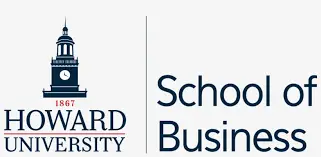

- Acceptance rate: 40%
- Average entry score: 1130-1280 SAT or 21-26 ACT
- Student-to-faculty ratio: 13:1
- Estimated cost of attendance (tuition and fees): $28,916-$34,326
- Average earning potential for graduates: $120,000 (MBA, Essence)
This institution boasts dynamic faculty, innovative programs, and a diverse student body. The School of Business offers undergraduate and graduate degrees in business, including MBA degrees.
Students prefer Howard University School of Business because of its small class sizes, personalized instruction, and career services. The school offers unique programs that integrate business, technology, and social justice to prepare students for careers in a global economy.
Howard University School of Business graduates are prepared to enter the workforce with solid business fundamentals and an understanding of how to adapt to a fast-paced environment.
The school is located in the heart of Washington, D.C. This gives students access to internships and networking opportunities with politicians, entrepreneurs, and executives who help them find jobs after graduation.
#23. Hough Graduate School of Business, University of Florida
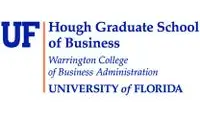
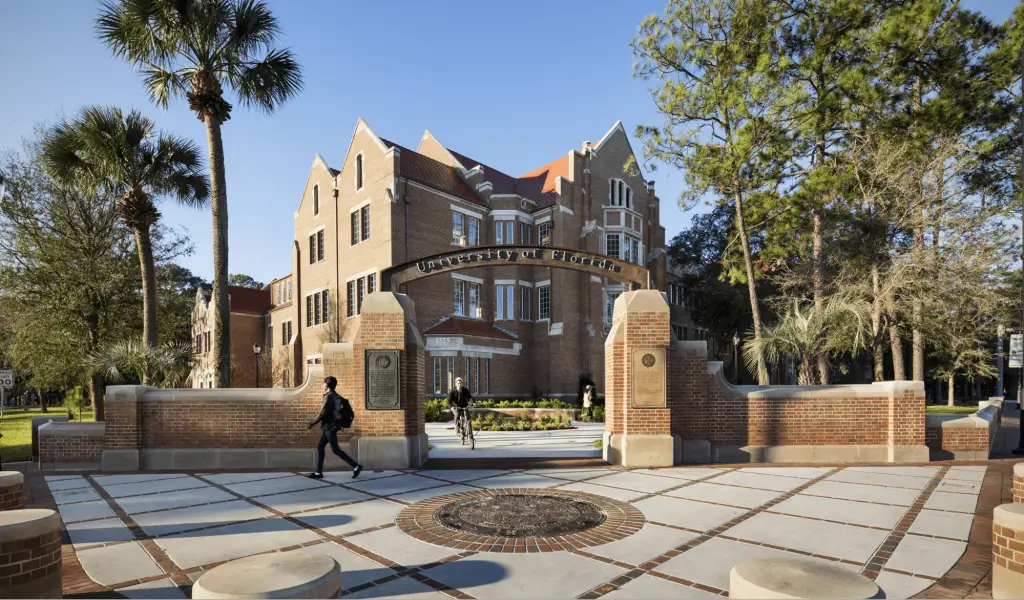
- Acceptance rate: 10%
- Average entry score: 660-700
- Student-to-faculty ratio: 18:1
- Estimated cost of attendance (tuition and fees): $61,000
- Average earning potential for graduates (MBA): $95,539 ( The Economist)
The Hough Graduate School of Business provides a unique environment that blends the best practices of a traditional business school with innovative technology. This school is constantly evolving to meet the needs of students in an ever-changing business environment.
The Hough School offers diverse programs to attract students with varied interests and career goals. This school offers master’s degrees in accounting, finance, management, marketing, and strategy. Students can also earn a doctoral degree in business administration or information systems.
Hough School faculty members are nationally recognized thought leaders in their fields of expertise. They bring real-world experience into the classroom.
#22. Tepper School of Business, Carnegie Mellon University
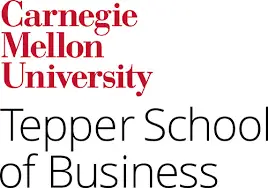

- Acceptance rate: 27.7%
- Average entry score: 702 GMAT
- Student-to-faculty ratio: 10:1
- Estimated cost of attendance (undergraduate tuition and fees): $67,822-$80,540
- Average earning potential for graduates (with MBA): $148,000 (Carnegie Mellon University)
The Tepper School of Business at Carnegie Mellon University is a top-ranked business school with a global reputation for educating leaders who make a difference in the world. They focus on creating a culture that fosters innovation, collaboration, and entrepreneurialism.
As the business world continues to change, the Tepper School of Business is constantly innovating and adapting to ensure students are ready for the future. This school’s programs emphasize business analytics to build students’ ability to analyze data and make informed decisions.
Similar articles like this:
#21. The Carroll School of Management, Boston College


- Acceptance rate: 35%
- Average entry score: 303-322 GRE or GPA 3.36
- Student-to-faculty ratio: 11:1
- Estimated cost of attendance (tuition and fees): $52,00-$63,130
- Average earning potential for graduates (with MBA): $116,214 (Boston College)
The Carroll School of Management integrates liberal arts into business education, fostering an environment that emphasizes the importance of ethical leadership and global understanding.
The school’s mission is to prepare students for a world where technology and globalization change how we live and do business.
At Carroll, students learn both the skills they need to succeed in business and how to apply them ethically. The school’s unique approach is reflected in its curriculum.
You can earn an undergraduate or a graduate business degree at the Carroll School of Management. Whether you want to enter the world of business or already work in it, Carroll’s curriculum will equip you with the tools to excel.
#20. Robert H. Smith School of Business, University of Maryland, College Park


- Acceptance rate: 36%
- Average entry score: 635 GMAT
- Student-to-faculty ratio: 18:1
- Estimated cost of attendance (tuition and fees): $93,562.56
- Average earning potential for graduates (with MBA): $121,103 (Robert H. Smith School of Business)
Robert H. Smith School of Business offers executive and graduate business degrees. The school’s programs are designed to prepare you to meet the challenges of today’s business world.
With a focus on real-world experience and practical knowledge, the Robert H. Smith School of Business prepares students for future opportunities. The faculty is made up of accomplished business professionals and scholars.
They teach students to think critically, communicate effectively, and navigate the ever-changing business landscape. These skills will enable you to solve problems, lead teams, and create innovative solutions.
#19. McDonough School of Business, Georgetown University
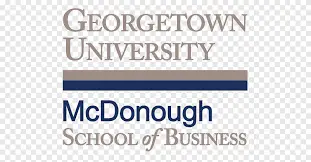

- Acceptance rate: 47.7%
- Average entry score: 697 GMAT or 3.29 GPA
- Student-to-faculty ratio: 11:1
- Estimated cost of attendance (tuition and fees): $56,000-$149,688
- Average earning potential for graduates: $96,916 (McDonough School of Business)
The McDonough School of Business at Georgetown University provides a rigorous and challenging academic experience that prepares students for careers in business.
This school’s experiential learning model immerses students in real-world business challenges, allowing them to gain valuable knowledge through hands-on experiences.
Get that competitive edge with Georgetown’s MBA program. The faculty at McDonough is responsible for the top-notch education that students receive.
Their expertise in the field of business allows them to provide students with a high level of knowledge and understanding of real-world applications.
#18. W.P. Carey School of Business, Arizona State University

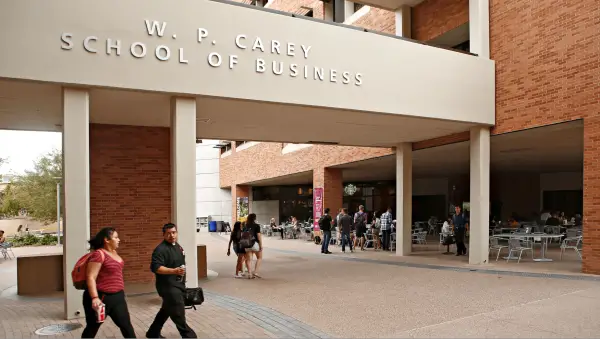
- Acceptance rate: 32%
- Average entry score: 684 GMAT or 1160 SAT
- Student-to-faculty ratio: 20:1
- Estimated cost of attendance (tuition and fees): $31,070-$51,882
- Average earning potential for graduates: $56,389 (W.P. Carey School of Business)
The W.P. Carey School of Business at Arizona State University is one of the most respected business schools in the country, offering world-class education to students from all over the globe.
The school offers undergraduate and graduate degrees in various fields. W.P. Carey also offers online programs to help students advance their careers while still working full-time.
The school’s online MBA program is known for its flexibility and convenience. Students can choose from various courses offered in five different formats: regular, self-paced, accelerated, weekend, and summer.
W.P. Carey has a special program designed for the Chinese student population. This business-focused curriculum is designed to meet the needs of students with little to no English experience.
Similar articles like this:
- 25 Best Dental Schools In The US
- 25 Best Schools For Geology In The US
- 25 Best Schools For Marine Biology In The US
#17. Samuel Curtis Johnson Graduate School of Management, Cornell University


- Acceptance rate: 33%
- Average entry score: 700 GMAT
- Student-to-faculty ratio: 9:1
- Estimated cost of attendance (tuition and fees): $164,442
- Average earning potential for graduates: $127,718 (Johnson Graduate School)
Study at the Samuel Curtis Johnson Graduate School of Management. You’ll gain access to a world-class faculty that includes Cornell’s top business minds and industry leaders. The school incorporates the latest research in business, psychology, and economics to prepare you for a career in management.
The program is a blend of theory and practice, with courses that cover finance, accounting, marketing, operations management, entrepreneurship, and innovation. Full-time faculty members who are recognized experts in their fields teach courses in small-group settings.
Graduates of the Johnson School have gone on to successful careers at companies. The Johnson School’s MBA program focuses on leadership development, management skills, and analytical thinking.
It is designed for students who want to advance their careers by developing the knowledge and skills needed to lead in today’s business environment.
#16. Yale School of Management, Yale University
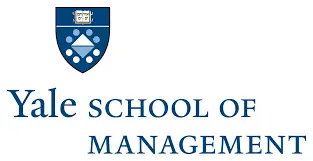

- Acceptance rate: 23.7%
- Average entry score: 680-760 GMAT or 160-170 GRE
- Student-to-faculty ratio: 6:1
- Estimated cost of attendance (tuition and fees): $108,780
- Average earning potential for graduates: $130,000 (Yale SOM)
The Yale School of Management (SOM) is the graduate business school at Yale University in New Haven, Connecticut. The school offers a wide range of master’s and doctoral degree programs to students worldwide.
Yale SOM prepares leaders for a world of rapid change and innovation. Their community of scholars, students, and practitioners share a common commitment to the highest standards of scholarship and teaching.
As an institution of global reach, Yale SOM seeks diversity in its students, hiring staff, and partnerships with corporations.
The school creates a welcoming environment for all students and staff, regardless of gender identity or expression, sexual orientation, disability status, race or ethnicity, religion, or spiritual beliefs.
#15. Darden Graduate School of Business Administration, University of Virginia


- Acceptance rate: 26%
- Average entry score: 720 GMAT
- Student-to-faculty ratio: 15:1
- Estimated cost of attendance (tuition and fees): $101,197-$105,129
- Average earning potential for graduates: $175,000 (Darden Graduate School)
Through its many graduate programs, Darden creates and disseminates knowledge that educates leaders in business and government. Darden also fosters a global community of practice among learning professionals around the world.
The University of Virginia provides an environment that promotes innovation, creativity, and integrity. As a diverse community where inclusion is valued above all, the university commits itself to foster an environment where everyone can thrive regardless of identity or background.
Darden’s graduate programs create leaders who distinguish themselves in their chosen fields. They combine rigorous academic research, leadership development, and practical application of knowledge to prepare students for careers as innovative leaders in business or government.
#14. Fuqua School of Business, Duke University


- Acceptance rate: 24.9%
- Average entry score: 660-750 GMAT
- Student-to-faculty ratio: 8:1
- Estimated cost of attendance (tuition and fees): $100,269
- Average earning potential for graduates: $160,055 (E-Gmat)
The Fuqua School of Business, located in the heart of Durham, North Carolina, prepares students to lead and serve in all areas of business. Fuqua educates leaders who will make a lasting difference in the world by applying their knowledge with integrity.
They accomplish this through a holistic approach to learning that emphasizes the development of critical thinking and judgment, ethical decision-making, effective communication, teamwork, and leadership skills.
Fuqua offers an MBA, Master of Management, Master of Quantitative Management, Ph.D., and Executive education programs.
Similar articles like this:
- 25 Best Schools For Agricultural Sciences In The US
- 25 Best Schools For Renewable Energy Degrees In The US
- 25 Best Engineering Schools In The US
#13. MIT Sloan School of Management
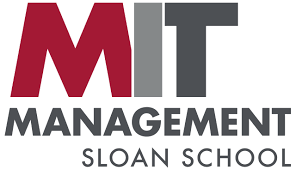

- Acceptance rate: 14.6%
- Average entry score: 690-760 GMAT or 158-169 GRE
- Student-to-faculty ratio: 3:1
- Estimated cost of attendance (tuition and fees): $119,995
- Average earning potential for graduates: $192,000 (Emolument)
MIT Sloan is a world-class business school at the intersection of technology, management, and entrepreneurship. They educate leaders who will transform organizations for the digital age.
MIT Sloan offers a unique educational experience that prepares students to lead in the innovation economy. Their experienced faculty, modern facilities, and global alumni network help students develop the skills they need to succeed in today’s business environment.
At MIT Sloan, you can earn a bachelor’s, master’s, or Ph.D. in business management. These degrees will give you a broad understanding of business.
#12. McCombs School of Business, The University of Texas at Austin
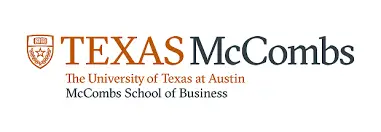

- Acceptance rate: 34%
- Average entry score: 1384 SAT, 31 ACT, or 702 GMAT
- Student-to-faculty ratio: 18:1
- Estimated cost of attendance (tuition and fees): $52,270
- Average earning potential for graduates: $160,000 (E-Gmat)
The McCombs School of Business at The University of Texas at Austin provides a world-class business education that prepares students for success in today’s global economy. Students learn how to apply theories and principles to real-world situations and problems.
This school gives everyone the tools they need to make strategic decisions and lead effectively in any organization. McCombs offers undergraduate and graduate degrees in business to develop leaders who are ready to take on the challenges of the 21st century.
With a strong commitment to research, McCombs has faculty members who are actively engaged in conducting business and management research.
#11. Stephen M. Ross School of Business, University of Michigan–Ann Arbor


- Acceptance rate: 27%
- Average entry score: 690-760 GMAT
- Student-to-faculty ratio: 15:1
- Estimated cost of attendance (tuition and fees): $168,500-$173,500
- Average earning potential for graduates: $165,000 (Michigan Ross)
Through its interdisciplinary approach, Ross offers a unique environment for students to learn the fundamentals of business and management. The school’s well-rounded curriculum focuses on leadership, enterprise, and innovation.
Ross strongly emphasizes experiential learning and offers many opportunities for students to gain real-world experience through internships, student organizations, community service projects, and more.
Its programs equip students with the skills they need to lead teams, manage businesses, and succeed in an ever-changing global economy. Ross’s MBA programs are also known for their flexibility and affordability. Students can opt for either a part-time or full-time schedule, allowing them to continue working while earning their degree.
#10. Questrom School of Business, Boston University

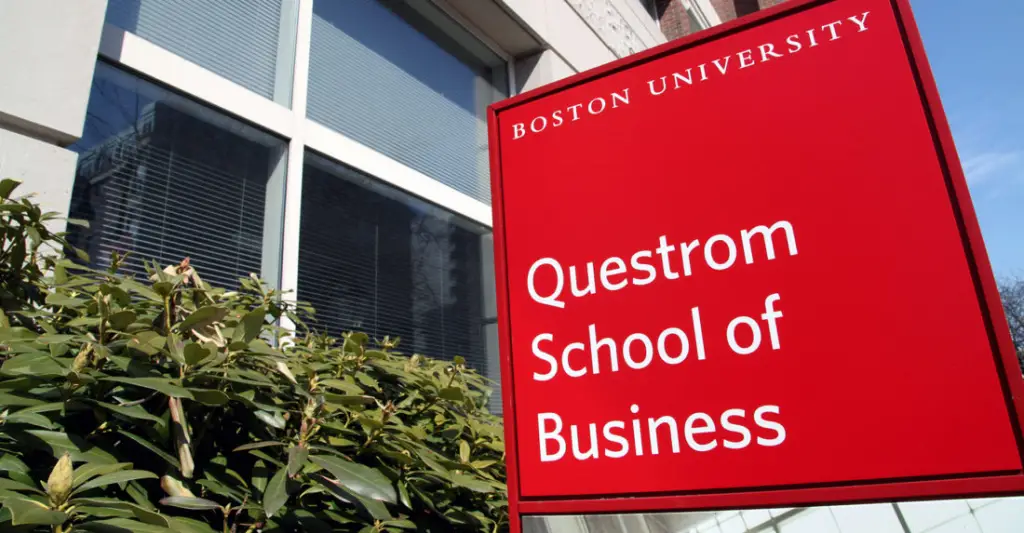
- Acceptance rate: 51%
- Average entry score: 640-700 GMAT
- Student-to-faculty ratio: 11:1
- Estimated cost of attendance (tuition and fees): $82,918
- Average earning potential for graduates: $118,858 (Boston University)
The Questrom School of Business offers programs at the graduate and undergraduate levels. This school’s full-time MBA program is one of the most popular in Massachusetts. It offers students the chance to gain a global perspective on business while earning their degree.
Busy professionals can also take advantage of Questrom’s part-time MBA program. Students in this option enjoy the same curriculum as the full-time program but in a flexible format that allows them to continue working while attending classes.
The school is home to a distinguished faculty that includes several well-known business leaders. These experts bring their experiences in the corporate world to the classroom, where they work with students to provide them with invaluable insight into how businesses operate.
Similar articles like this:
- 25 Best Forestry Schools In The US
- 25 Best Schools For Environmental Science In The US
- 25 Best Schools For Health Sciences Degrees In The US
#9. Kellogg School of Management, Northwestern University
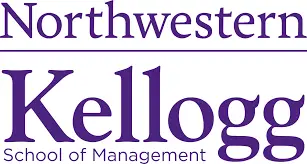

- Acceptance rate: 20%
- Average entry score: 620-780 GMAT
- Student-to-faculty ratio: 6:1
- Estimated cost of attendance (tuition and fees): $117,259-$144,502
- Average earning potential for graduates: $145,000
Kellogg School of Management trains up-and-coming business leaders to think strategically, innovate and lead with confidence. The school has a reputation for its rigorous academics and innovative management education.
The Kellogg School of Management offers two MBA programs: full-time, part-time, and executive programs. Students may also pursue a Master of Science degree in Management Studies or a doctoral degree.
The school strives to build a community among students and alumni by offering networking events and mentorship programs. This could be a valuable opportunity for those interested in pursuing corporate or consulting careers after graduation.
#8. Booth School of Business, The University of Chicago
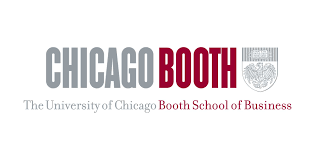
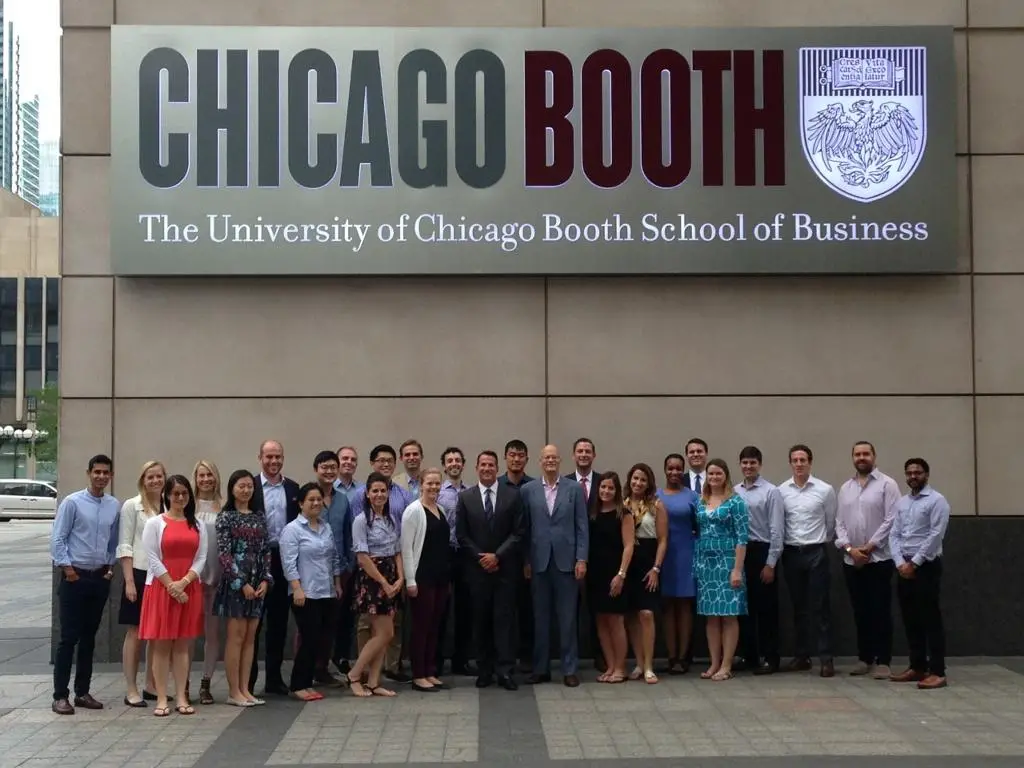
- Acceptance rate: 23.5%
- Average entry score: 724 GMAT
- Student-to-faculty ratio: 5:1
- Estimated cost of attendance (tuition and fees): $115,062
- Average earning potential for graduates: $175,000 (Business Insider)
Learn in an environment that fosters creativity, collaboration, and innovation. The University of Chicago’s Booth School of Business is known for its rigorous academics and innovative management education.
Chicago Booth’s approach to business education is unique. It relies on a diverse faculty and student body that brings different backgrounds and experiences to the classroom.
This helps students develop highly-sought after skills such as critical thinking, problem-solving, and creativity.
The school’s emphasis on developing leadership skills and fostering a sense of community is also noteworthy. Students learn how to work with diverse groups toward a common goal to prepare for careers in business. Booth offers MBA, executive MBA and Ph.D. degrees to its students.
#7. Haas School of Business, University of California–Berkeley


- Acceptance rate: 13.2%
- Average entry score: 760 GMAT
- Student-to-faculty ratio: 20:1
- Estimated cost of attendance (tuition and fees): $107,168-$116,178
- Average earning potential for graduates: $150,000 (Haas School of Business)
The Haas School of Business at UC Berkeley is one of the top-ranked business schools in the country. They offer a unique curriculum that integrates management theory, financial analysis, and technology.
This allows students to develop a strong understanding of business fundamentals and how they relate to current events.
The Haas School of Business offers a wide range of undergraduate and graduate degrees, including an MBA. They also offer several certificate programs for students interested in specific areas of study.
Students at the Haas School benefit from access to world-class faculty and research centers. The school also offers career services to help students navigate the job market after graduation.
#6. The Wharton School, University of Pennsylvania
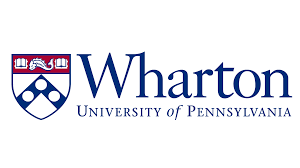

- Acceptance rate: 9%
- Average entry score: 733 GMAT
- Student-to-faculty ratio: 6:1
- Estimated cost of attendance (tuition and fees): $84,874 (The Wharton School)
- Average earning potential for graduates: $175,000 (Fortune)
The Wharton School offers several degree programs across its 10 departments. These programs are designed for students interested in business, economics, and public policy.
Wharton’s modern facilities, experienced faculty, and student-centered campus make it a top choice for business students.
The school has a variety of resources to help students succeed, including career management services and industry-specific programs. The university also offers financial aid to students who qualify.
Nearby Philadelphia offers many opportunities for students to gain real-world experience while they are still in school.
What’s it like to study at Wharton School?
Similar articles like this:
- 25 Best Immunology Schools In The US
- 25 Best Microbiology Schools In The US
- 25 Best Education Schools In The US
#5. Leonard N. Stern School of Business, NYU
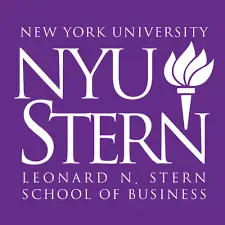

- Acceptance rate:7%
- Average entry score: 720 GMAT or 1531 SAT
- Student-to-faculty ratio: 2:1
- Estimated cost of attendance (tuition and fees): $$63,876-$82,176
- Average earning potential for graduates: $155,000 (Stern School)
The Leonard N. Stern School of Business at New York University is an internationally recognized center for business education.
This school offers a broad range of undergraduate, graduate, and doctoral programs that prepare students for successful careers in business and management.
The wide range of course offerings allows students to develop transferable skills across different types of organizations. Stern School’s diversity also gives students access to a wide range of perspectives, cultures, and experiences.
Leonard N. Stern School of Business’s liberal arts approach to business education emphasizes critical thinking, communication skills, and ethical decision-making.
What’s it like to study at Leonard N. Stern School of Business?
#4. Anderson School of Management, UCLA


- Acceptance rate: 12%
- Average entry score: 710 GMAT
- Student-to-faculty ratio: 9:11
- Estimated cost of attendance (tuition and fees): $88,245
- Average earning potential for graduates: $116,000 (Anderson School)
Located in the world’s creative capital, Anderson School of Management equips students with the knowledge and skills to become effective leaders in business.
This school boasts a distinctively global perspective. Students learn from an unparalleled faculty that includes leading scholars from around the world.
The school’s diverse student body helps students develop the skills they need to succeed in a rapidly changing global marketplace.
UCLA’s Anderson School has been ranked among the top business schools in the country by U.S. News & World Report for its undergraduate, graduate, and doctoral programs.
What’s it like to study at Anderson School of Management?
#3. Columbia Business School
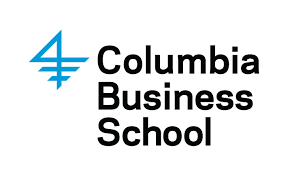

- Acceptance rate: 18.2%
- Average entry score: 700-760 GMAT
- Student-to-faculty ratio: 6:1
- Estimated cost of attendance (tuition and fees): $77,376
- Average earning potential for graduates: $150,000 (Emolument)
Columbia Business School is one of the world’s leading business schools. It is located in New York City and has over 1,200 students enrolled in a wide variety of programs at different levels.
The school offers degrees across various disciplines, including finance, marketing, entrepreneurship, and technology management.
Columbia Business School has been ranked among the top business schools by U.S News & World Report for its graduate programs.
The faculty at Columbia Business School includes prominent economists, scholars, and business leaders. These experts offer their students a variety of perspectives on the most pressing issues in business today.
What’s it like to study at Columbia Business School?
#2. Stanford Graduate School of Business


- Acceptance rate: 6.1%
- Average entry score: 700 GMAT
- Student-to-faculty ratio: 6:1
- Estimated cost of attendance (tuition and fees): $124,389-$149,532
- Average earning potential for graduates: $158,400 (Business Insider)
The Stanford Graduate School of Business is one of the most prestigious business schools in the world. It has been ranked among the top 10 graduate programs by U.S. News & World Report.
This school focuses on understanding how to think about business rather than just providing students with technical skills. The Stanford Graduate School of Business faculty includes distinguished scholars and entrepreneurs with a passion for teaching.
This school also boasts a student body that is highly diverse in terms of nationality, ethnicity, culture, and educational background. Study business at Stanford, and you will learn from the best and be exposed to a wealth of opportunities.
What’s it like to study at Stanford Graduate School?
#1. Harvard Business School
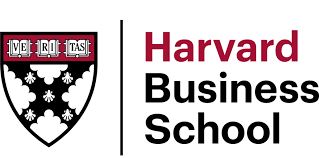

- Acceptance rate: 12%
- Average entry score: 730 GMAT
- Student-to-faculty ratio: 7:1
- Estimated cost of attendance (tuition and fees): $76,000
- Average earning potential for graduates: $175,000 (Fortune)
Harvard Business School is an elite institution that offers one of the best business programs in the world. This school is highly selective, admitting only about 12% of applicants each year.
Harvard Business School is known for its rigorous curriculum, which focuses on developing students’ leadership abilities and analytical skills.
Students are exposed to cutting-edge business practices, as well as lessons from the successes and failures of great leaders. The school offers a wide range of degree programs for students to choose from, including full-time MBA programs and executive education courses.
Harvard Business School is located in Boston, Massachusetts, and has been educating leaders for more than 100 years.
What’s it like to study business at Harvard Business School?
Conclusion
The leading business schools in the US offer students a wide variety of opportunities and resources for building successful careers.
These schools have rigorous academic programs, experienced faculty members, and strong connections to the business world. Students who receive a degree from this school are equipped with the skills, knowledge, and connections needed to succeed in today’s job market.
Attending one of the top business schools can help you achieve your career goals—no matter your field.
Selection Criteria
Here is a list of the criteria we used to select the 25 best business schools in America:
- Reputation and ranking of the school: We considered schools with a strong reputation and high ranking in the field of business.
- Faculty expertise and specialization: We researched the faculty member’s areas of expertise to ensure that the business department has experts in all major fields.
- Facilities, resources, and access to technology: Our team considered the quality of the school’s facilities and resources, including access to research centers and libraries.
- Cost and financial aid: Our research took into account both the cost of attendance and the availability of financial aid for students.
- Diversity and inclusivity: We considered the school’s commitment to diversity and inclusivity as we made our decision. We believe that an inclusive environment will contribute to your overall learning experience at this institution.
- Graduation and placement rate: Our research team looked at the school’s graduation and placement rates to determine how well students fared after graduation.
- Extracurricular activities: We evaluated the availability of clubs and other activities that would appeal to you.
- Alumni network and post-graduation support: We considered the school’s alumni network and its post-graduation support services when we evaluated. These are important factors in finding jobs and receiving mentorship.
Frequently Asked Questions
Q1. What are the ranking criteria for the best business schools?
Ranking criteria for business schools can include factors such as:
- Average GMAT score
- GPA of admitted students
- Starting salaries
- Employment rates for graduates
- The reputation of the school and its faculty
- Number and quality of resources available to students
- Overall satisfaction of students and alumni.
Q2. What is the average cost of attending these top business schools?
The cost of attending a top business school in the US can vary widely, ranging from around $50,000 to over $100,000 per year for tuition and fees.
Aside from tuition, students can expect to pay for housing and other living expenses. The cost of these monthly payments is often several thousand dollars per year.
Q3. What is the acceptance rate for these top business schools?
The acceptance rate for top business schools varies, but many of the most selective schools have acceptance rates of 10% or less.
The admissions process at schools such as Harvard and Stanford is more selective than most, requiring applicants to demonstrate a high level of competence in a broad range of academic and extracurricular areas.
Q4. What industries do graduates from these business schools typically work in?
Graduates from top business schools can work in various industries, including finance, consulting, technology, healthcare, and more.
The specific industry will depend on the student’s interests, skills, career goals, market conditions, and job opportunities.
Q5. What is the average starting salary for graduates of these business schools?
The average starting salaries of graduates from top business schools are influenced by a number of factors, including the industry, location, and experience level.
However, many graduates can expect to earn salaries in the range of $100,000 or more. Some industries and positions offer even higher pay.
References
[1] Official Websites
[2] Salary Data from Glass Door, College Factual, College Simply, Zippia, Gradreports
[3] Ranking references, including news media such as forbes.com, Princeton Review, 2023 Best Business Schools (MBA), Fortune.com


